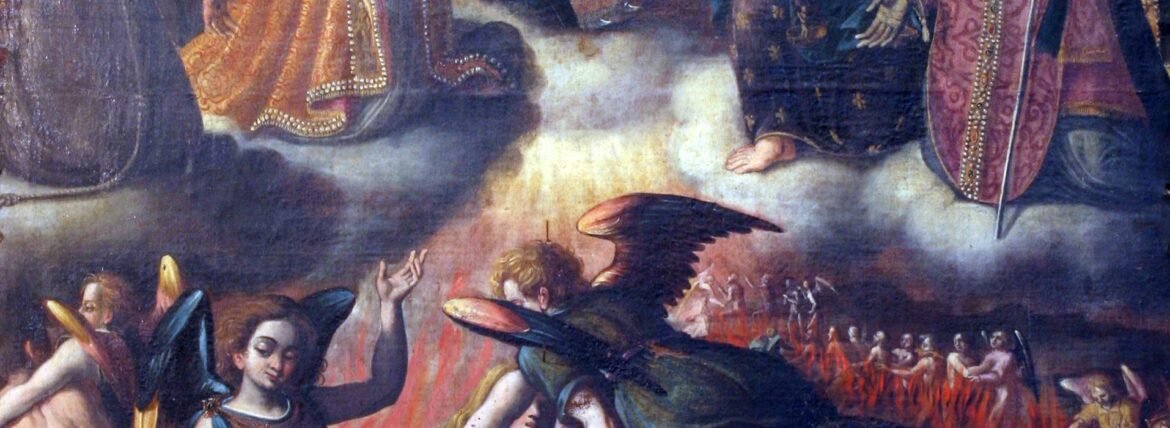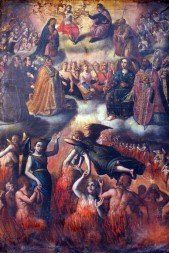The Doctrine of Purgatory
Remembering the Holy Souls in November
On All Souls’ Day (November 2), and throughout the entire month of November, we are called in a special way to remember “our brothers and sisters who have fallen asleep in the hope of the resurrection” (Eucharistic Prayer II). We especially remember the Holy Souls in purgatory.
Growing in Faith: Understanding Purgatory
In this Year of Faith, we are invited to deepen our understanding of the truths of our Catholic faith. One important truth is the doctrine of purgatory. Although rooted in ancient Christian tradition, this teaching is not accepted by all Christians. It is essential that we seek to understand what the Church means when it teaches about purgatory.
The word “purgatory” comes from the Latin purgare, meaning “to purify” or “to purge.” The Catechism of the Catholic Church describes purgatory as a state of final purification after death and before entering heaven, for those who died in God’s friendship but were not fully purified. It is a final cleansing of human imperfection before one can enter the joy of heaven (CCC 1031; cf. 1472).
The Need for Purification
Jesus declared in the Beatitudes: “Blessed are the pure in heart, for they shall see God” (Matthew 5:8). To see God face to face in heaven (the beatific vision), our hearts must be completely purified. This purification can begin on earth, but if it is not finished by the time we die, it will continue in purgatory—a condition where every trace of attachment to evil is removed and every imperfection of the soul is corrected.
Insights from Saint Catherine of Genoa
Throughout Church history, there has been much speculation about purgatory. One well-known vision comes from Saint Catherine of Genoa, a sixteenth-century saint. Pope Benedict XVI explains that, unlike many others, “Catherine did not see purgatory as a place deep in the earth; for her, it is not an exterior but an interior fire. This is purgatory: an inner fire.”
Saint Catherine said, “The soul presents itself to God still bound to the desires and suffering that derive from sin, making it impossible to enjoy the beatific vision of God.” She emphasized that God’s purity and holiness are so great that a soul stained by sin cannot be in His presence. Pope Benedict continues: “We also feel how distant we are, full of things that prevent us from seeing God. The soul is aware of God’s immense love and perfect justice and suffers for having failed to respond perfectly to this love; love itself becomes a flame that cleanses the soul from the residue of sin.”
I find the words of Saint Catherine and our Holy Father helpful in understanding purgatory. It is a state or condition in which God’s love penetrates the heart, a purifying fire or light. This fire is painful because it brings awareness of our sins—our offenses against a God who loves us deeply. I think of the pain we feel when we hurt someone we love.
Prayers and Sacrifices for the Holy Souls
What about prayers and sacrifices for the Holy Souls in purgatory? From the very beginning, the Church has prayed for the deceased, especially through the Eucharistic Sacrifice. This has always been the Church’s practice. And the Church believes as she prays—remember the famous maxim lex orandi, lex credendi: “the law of prayer is the law of faith.”
The Communion of Saints
This reminds us of the important doctrine of the communion of saints. In the Apostles’ Creed, we profess belief in “the holy catholic Church, the communion of saints.” This communion includes the saints in heaven, those undergoing purification in purgatory, and disciples still on earth.
We are all united to Christ and to one another as brothers and sisters in Christ. The saints in heaven intercede for us. As we live in communion on earth, we also live in communion with the saints in heaven and the faithful departed undergoing purification. We help them with our prayers, and they intercede for us. We are all part of the one family of God.
Blessed John Paul II wrote about purgatory and the communion of saints:
“Those in the state of purification are united both with the blessed who already enjoy eternal life and with us on earth on our way to the Father’s house. Just as believers are united in the Mystical Body on earth, so after death those in purification experience the same ecclesial solidarity through prayer, suffrages, and love for their brothers and sisters in faith. Purification is lived within the bond between those on earth and those who enjoy eternal beatitude.”
A Call to Prayer in November
I encourage everyone to pray for the dead especially during November—our deceased loved ones and all the Holy Souls enduring the trial and suffering of purgatory because of the punishment due to sin, which separates them from God. They await the eternal joy of the beatific vision. Let us show our solidarity by entrusting them to the Lord in our prayers and sacrifices. I especially encourage the holy practice of offering Mass intentions for the deceased, an act of true charity and love.

